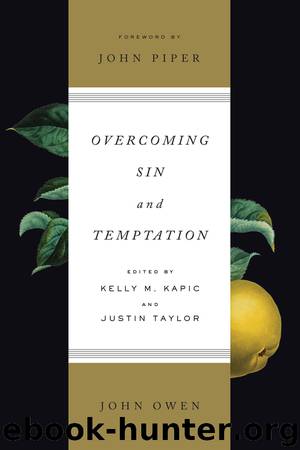Overcoming Sin and Temptation by Kelly M. Kapic & Justin Taylor

Author:Kelly M. Kapic & Justin Taylor
Language: eng
Format: epub
Publisher: Crossway
1 particular, characteristic
2 effect
3 perceived by the senses (not necessarily sexual)
4 deadly
5 offers
6 is of necessity
7 created at the same time as
8 seizing, taking control with power and force
9 male head of household
10 be freed or released from it
11 disinclination, unwillingness
12 fluctuating but persistent
[CHAPTER 3]
Having manifested indwelling sin, whereof we treat in the remainders of it in believers, to be a law, and evinced in general the power of it from thence, we shall now proceed to give particular instances of its efficacy and advantages from some things that generally relate unto it as such. And these are three: (1) its seat and subject; (2) its natural properties; and (3) its operations and the manner thereof—which principally we aim at and shall attend unto.
THE HEART IS THE SEAT AND SUBJECT OF THIS LAW OF SIN
First, for the seat and subject of this law of sin, the Scripture everywhere assigns it to be the heart. There indwelling sin keeps its special residence. It has invaded and possessed the throne of God himself: “Madness is in the heart of men while they live” (Eccles. 9:3). This is their madness, or the root of all that madness which appears in their lives. “Out of the heart proceed evil thoughts, murders, adulteries, fornications, thefts, false witness, blasphemies,” etc. (Matt. 15:19). There are many outward temptations and provocations that befall men, which excite and stir them up unto these evils; but they do but as it were open the vessel, and let out what is laid up and stored in it. The root, rise, and stirring of all these things is in the heart. Temptations and occasions put nothing into a man, but only draw out what was in him before, hence is that summary description to the whole work and effect of this law of sin, “Every imagination of the thoughts of man’s heart is only evil continually” (Gen. 6:5; so also 8:21). The whole work of the law of sin, from its first rise, its first coining of actual sin, is here described. And its seat, its work-house, is said to be the heart; and so it is called by our Savior “the evil treasure of the heart”: “An evil man, out of the evil treasure of his heart, brings forth evil things” (Luke 6:45). This treasure is the prevailing principle of moral actions that is in men. So, in the beginning of the verse, our Savior calls grace “the good treasure of the heart” of a good man, whence that which is good does proceed. It is a principle constantly and abundantly inciting and stirring up unto, and consequently bringing forth, actions conformable and like unto it, of the same kind and nature with itself. And it is also called a treasure for its abundance. It will never be exhausted; it is not wasted by men’s spending on it; yea, the more lavish men are of this stock, the more they draw out of this treasure, the more it grows and abounds!
Download
This site does not store any files on its server. We only index and link to content provided by other sites. Please contact the content providers to delete copyright contents if any and email us, we'll remove relevant links or contents immediately.
The Lost Art of Listening by Michael P. Nichols(7494)
Why I Am Not A Calvinist by Dr. Peter S. Ruckman(4149)
The Rosicrucians by Christopher McIntosh(3513)
Wicca: a guide for the solitary practitioner by Scott Cunningham(3167)
Signature in the Cell: DNA and the Evidence for Intelligent Design by Stephen C. Meyer(3132)
Real Sex by Lauren F. Winner(3016)
The Holy Spirit by Billy Graham(2944)
To Light a Sacred Flame by Silver RavenWolf(2814)
The End of Faith by Sam Harris(2733)
The Gnostic Gospels by Pagels Elaine(2527)
Waking Up by Sam Harris(2454)
Nine Parts of Desire by Geraldine Brooks(2361)
Jesus by Paul Johnson(2352)
Devil, The by Almond Philip C(2325)
The God delusion by Richard Dawkins(2305)
Heavens on Earth by Michael Shermer(2278)
Kundalini by Gopi Krishna(2180)
Chosen by God by R. C. Sproul(2161)
The Nature of Consciousness by Rupert Spira(2104)
